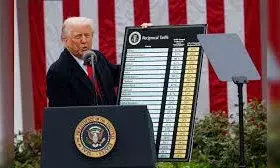The Implications of U.S. Tariff Policies and the Future of the WTO
Explore the implications of US tariff policies on the World Trade Organization and global commerce, with expert perspectives on the future of international trade.;

In recent years, the global trade landscape has undergone significant shifts, particularly with the introduction of new tariff policies by the United States government under the Trump administration.These policies, along with a broader retreat from multilateral trade agreements, have led to discussions about the viability and future of the World Trade Organization (WTO). As nations grapple with rising trade tensions and protectionist measures, the role of the WTO—which was created to facilitate free trade and resolve disputes—has come under scrutiny. The implications of U.S. tariff policies on the WTO, the responses from other member countries, and expert perspectives on the future of global commerce are key issues that demand attention.
The Trump administration’s tariffs, particularly those imposed on steel and aluminum in 2018 and various restrictions targeting China, were justified as protective measures against unfair trading practices. However, they also signaled a shift toward unilateralism, with the United States prioritizing its own interests over global trade agreements. This approach led to retaliatory measures from affected nations, including China’s counter-tariffs on American goods. The escalation of trade disputes raised concerns about the relevance of the WTO, as the organization struggled to mediate such conflicts effectively. The WTO’s main purpose is to ensure that trade flows smoothly, but with major players disregarding established rules, questions arose about its legitimacy and effectiveness in maintaining a stable global trade environment.
The changing global trade landscape is reflected in economic data. WTO reports show that global merchandise trade volume growth slowed significantly in 2019, exacerbated by increasing trade tensions. Additionally, the rise of bilateral and regional trade agreements has contributed to a more fragmented system, making global trade less predictable and structured. Some experts argue that if major economies such as the European Union, Japan, and Canada disengage from WTO processes or prioritize regional agreements, global trade could become more complex and inefficient. The decline of multilateralism could result in prolonged negotiations, disrupting supply chains and affecting overall economic stability.
Leading trade experts have expressed concerns about the consequences of the U.S. retreat from the WTO. Former WTO Director-General Roberto Azevêdo warned that unilateral tariff measures weaken the rules-based trading system, increasing economic volatility and uncertainty. Additionally, a report from the Institute for International Finance (IIF) highlighted the economic risks of trade protectionism, estimating that escalated trade disputes could reduce global GDP growth by up to 2%. Such a decline would disproportionately affect developing economies that depend on exports for economic growth.
As nations reassess the WTO’s role in global trade governance, its future remains uncertain. The organization faces challenges related to adapting to modern trade complexities, such as digital commerce and environmental sustainability. Experts argue that meaningful reforms are essential to ensure that the WTO remains relevant in the evolving economic landscape. WTO Deputy Director-General Alan Wolff emphasized the importance of reform, stating that modernization efforts are necessary for the organization to address contemporary trade issues effectively.
The impact of U.S. tariff policies has created a defining moment for international trade and the WTO’s future. While rising tensions and uncertainty pose challenges, they also present an opportunity for renewed dialogue on global trade cooperation. The preservation of a rules-based trading system depends on countries recognizing the benefits of multilateralism and working together to uphold fair trade practices. Only through collective efforts can nations navigate pressing challenges—including tariffs, technological disruptions, and environmental concerns—while ensuring the stability and efficiency of global commerce.
The weakening of the dispute resolution mechanism within the WTO, especially the paralysis of its Appellate Body due to U.S. opposition to new appointments, has left many disputes in limbo, further undermining the body’s authority. Moreover, the growing influence of protectionist policies and populist rhetoric in many parts of the world threatens to overshadow the decades of progress achieved under the WTO framework. There is also an urgent need to address imbalances between developed and developing countries in trade negotiations. As global economic power shifts, the WTO’s future may hinge not just on structural reform but on the political will of its members to commit once again to cooperative solutions.

